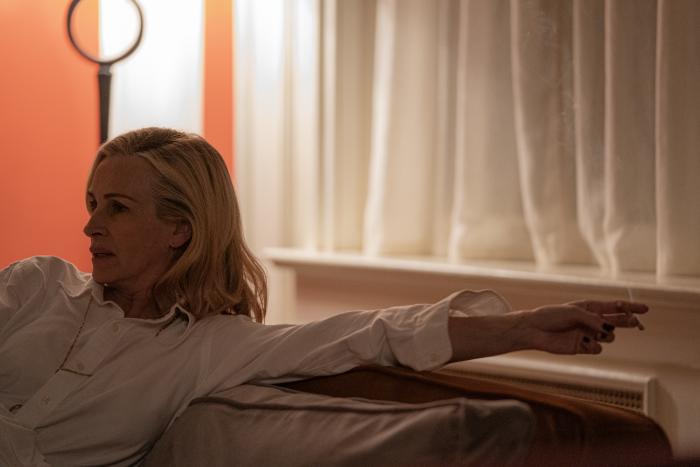By Jason Adams | Film | October 17, 2025

Call Me by Your Name auteur Luca Guadagnino is back at his blessed, beautiful bullshit (complimentary) with After the Hunt, his grandest Hollywood effort to date as it stars no less than the last of the real movie stars herself, Julia Roberts. Who, it should be said upfront, is giving one of her grandest, darkest, wiliest performances to date here. A sly but serious-minded fable cum thriller about the sexual piccadilloes of the intellectually inclined right in the heightened smackdab center of the #MeToo movement—making it now a period piece, as the film’s last act deftly acknowledges—this is thorniness done the Luca way.
Meaning with wit and incisiveness, and not just a little bit of sex appeal, all dark whispers sneaked in amongst stunning costumes and set decorations. Pitched somewhere between Nancy Meyers and Pier Paolo Pasolini, After the Hunt wants to poke at you with swords swathed in cashmere in that way only Guadagnino these days can muster. It’s to my eye another stylish, sticky success from the maestro of comfortable discomfort.
Roberts plays Alma Imhoff, a professor of Philosophy at Yale who’s teetering on the edge of her long long long overdue tenure. So too is her flirty friend and co-prof Hank Gibson (Andrew Garfield), though—notably much younger than Alma but nevertheless up for tenure right there beside her, this is just one of the many bits of gendered asymmetry that the script doesn’t feel the need to speak out loud but is pointedly present all the same. From the opening party scene where he’s perched bisexually on Alma’s sofa, we can immediately tell that Hank, with his loud, easy confidence and lustrous beard, is free to be provocative in ways that she’s had to sublimate over the years of her storied career.
Said party is a wonder of table setting, and I don’t just mean the casually arranged art books and pricey but not show-offy bric-à-brac littered about. All the characters we need to know and all of their messy mixed-up vibes are set up in this sequence, just as casually as those shabby-chic knick-knacks were placed. Besides a couple of extraneous students who’ll act as sort of a Greek Chorus wandering in and out of the proceedings, there’s foremost a threesome of note: there’s Alma’s dutiful, watchful husband Frederick, played by Luca’s good luck charm Michael Stuhlbarg, who once again flounces away with every scene he’s in. And there’s also Alma and Hank’s co-worker, the catty school therapist Kim (Chloe Sevingy), with an ear for Morrissey and a hairdo for the DMV.
Most important of all, there’s Alma’s most prized pet student, Maggie (Ayo Edebiri) — introduced as gay while simultaneously batting her big eyes at all of Hank’s cocky bluster — we’re told Maggie’s got a big crush on the teacher. Not Hank though, but rather Alma—Frederick says so, and Frederick seems to know. (Frederick seems to know everything.) Frederick also suggests Maggie’s not all that exceptional, intellectually speaking—that it’s just Alma being blinded yet again by an underling’s puppy-eyed devotion to Alma’s own brilliance. To which Alma smiles knowingly, a world of past experiences walking on by with a wave within it.
Thus are set the dominoes, and we’re off to the races as Hank and Maggie head out after the party, cavorting drunkenly in Alma’s hall as she peeps them through her front-door peephole. Cut to the next day—Hank’s sheepish, Maggie’s missing. And Alma’s only half-noticing any of it, so caught up in her own self-obsessions that she can barely see above the dust-storm of her own perfectly appointed maelstrom of words and thoughts and gorgeous white pants. (How does she keep them so clean with her hands so metaphorically bloody, one might ask.)
Anyway, Alma’s off in Alma-land until Maggie shows up that night, that is. Crouched outside Alma’s apartment door, soaked wet to the bone, she’s brandishing an upsetting story that Hank sexually assaulted her the night previous. To which Alma reacts, well, to say not so well is to state an understatement.
From there After the Hunt flirts with the expected He-Said-She-Said tête-à-tête dynamic, but less than you might think. Less than the trailer lets on! It seems pretty clear that, no matter the nitty-gritty specifics of it, something inappropriate happened that night. And the film’s more concerned with how this makes everybody behave in its awful wake.
So while that thriller aspect might make for an exciting trailer and it might get butts in seats, Guadagnino’s film isn’t really trying to be provocative toward the idea of “Believe All Women” in any lazy way. That’s a surface-level take, and this movie is legitimately aiming to probe deeper. Hank can cast all the aspersions on Maggie’s character that he wants to, and Alma can seize on the ones she needs to that make her feel better in the process. But After the Hunt is staring icy-eyed and aware straight back at all these people’s bullshit.
And yet, ye olde buzzword “unlikeable” as these folks might be, the actors all make a helluva meal outta them—for themselves and for us lucky folks watching. Guadagnino, along with assists from writer Nora Garrett’s clear-eyed script, sees right down to the bottom of what’s driving this pack of monied three-moves-ahead narcissists, and autopsies their foibles with a soft scalpel precision. Late revelations about Alma’s character, which directly influence her heretofore “aloof” behavior, are only as convenient as are any such story-beats in any such tightly wound tale of fiction. With every hand-wave and groan intricately performed by Roberts and Stuhlbarg and Garfield and Edebiri, every edit sharp as a knife, every sideways gag—the Woody-Allen-esque credits!—still perfectly aimed straight back at After the Hunt’s bleak heart. It’s a dark chamber piece of the soul, all dressed in crisp Ralph Lauren drag. The institutional rot sure is real pretty, isn’t it?